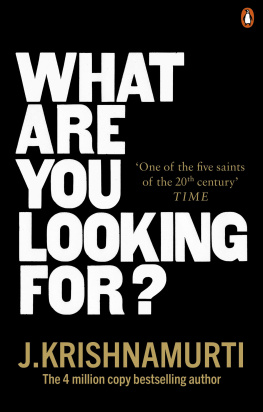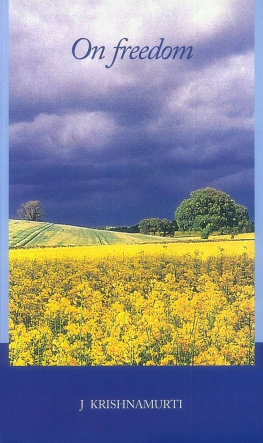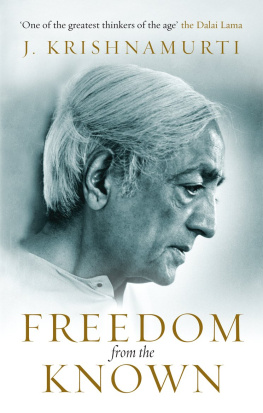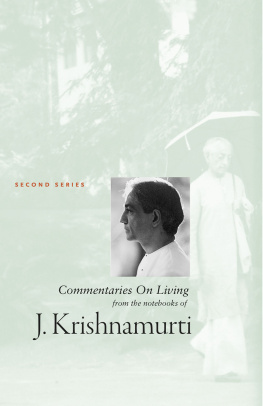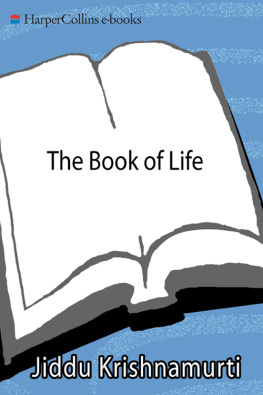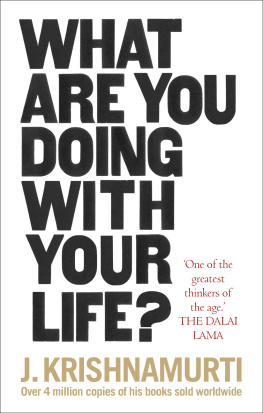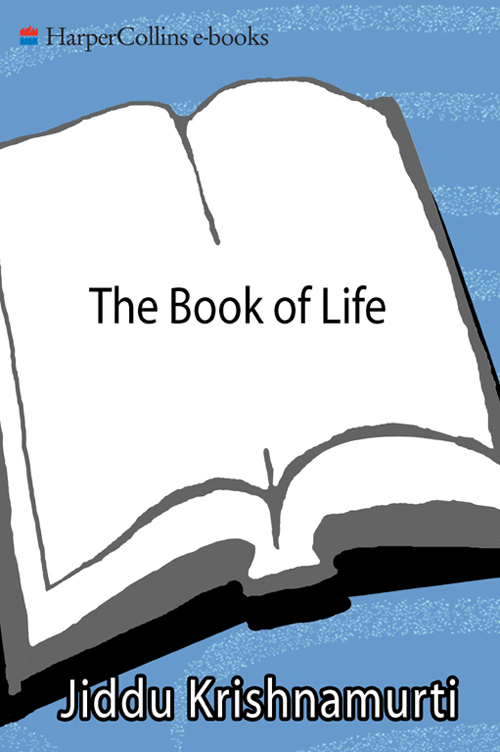I N 1934 K RISHNAMURTI SAID, Why do you want to be students of books instead of students of life? Find out what is true and false in your environment with all its oppressions and its cruelties, and then you will find out what is true. Repeatedly he pointed out that the book of life, which is ever changing with a vitality that cannot be held in thought, was the only one worth reading, all others being filled with secondhand information. The story of mankind is in you, the vast experience, the deep-rooted fears, anxieties, sorrow, pleasure and all the beliefs that man has accumulated throughout the millennia. You are that book.
This book, The Book of Life: Daily Meditations with Krishnamurti, is arranged in an order somewhat replicating the way Krishnamurti delivered his talks. He usually began with listening and the relationship between the speaker and the audience, and ended with subjects that naturally emerge when life is in order and greater depth begins to surface into consciousness. During his last days in 1985 and 1986 he talked about creativity and the possibility of a totally new way of life. This book has excerpts on those subjects.
Many themes reccurred throughout his teachings. His vision was the whole broad observation of the human condition wherein every aspect of life is interconnected. The Book of Life presents passages on a new theme for every week of the year with each topic developed over seven days. These quotations are identified by their source and referenced in the Sources index. Readers who are interested in exploring specific themes in greater depth are invited to go to the full texts of the books from which they are excerpted.
Krishnamurti began speaking publicly in 1929 with a voice that Aldous Huxley described as having intrinsic authority. His powerful exploration of the nature of truth and freedom has resulted in millions of copies of his talks and dialogues being published and translated into more than forty languages.
Krishnamurti, although shy and retiring, tirelessly gave thousands of talks, delivered without notes or preparation, essentially unfolding one seminal theme: Truth can be discovered by anyone, without the help of any authority and, as life is ever-present, in an instant. His talks span the whole range of personal and social conflict and concern. Observing the depth and scope of our behavior, as it occurs in the moment, becomes the necessary action in transforming ourselves and our society. When asked by someone attending one of his talks why he spoke and what he wanted to accomplish he replied, I want to tell you something, perhaps the way to find out what is realitynot the way as a system, but how to set about it. And if you can find this for yourself, there will not be one speaker, there will be all of us talking, all of us expressing that reality in our lives where we are. Truth cannot be accumulated. What is accumulated is always being destroyed; it withers away. Truth can never wither because it can only be found from moment to moment in every thought, in every relationship, in every word, in every gesture, in a smile, in tears. And if you and I can find that and live itthe very living is the finding of itthen we shall not become propagandists; we shall be creative human beingsnot perfect human beings, but creative human beings, which is vastly different. And that, I think, is why I am talking, and perhaps that is why you are here listening.
There is only the problem; there is no answer; for in the understanding of the problem lies its dissolution. Often, when he was asked a question, Krishnamurti responded, Let us find out what we mean by , thus examining the question and opening it up for inquiry rather than immediately giving an answer. For Krishnamurti, probing a question or problem fueled that inquiry rather than simply following a logical and intellectual search for an answer. The extracts in this book are presented to the reader as questions that might have been posed without a prompt from the reader for an immediate answer.
Krishnamurti pointed out that the dialogue with his listeners in the talks that he gave was not intellectual and was not anchored in thoughts and ideals. He said, After all, the purpose of these talks is to communicate with each other, and not to impose upon you a certain series of ideas. Ideas never change the mind, never bring about a radical transformation in the mind. But if we can individually communicate with each other at the same time and at the same level, then perhaps there will be an understanding which is not merely propaganda so these talks are not meant to dissuade or to persuade you in any way, either actually or subliminally.

In almost all his public talks and dialogues, Krishnamurti used the terms mankind or man when referring to the whole of humanity. But in the latter part of his life, he frequently interrupted himself to tell his audience, Please, when I say mankind, I mean the women, too. So dont get mad at me.
Krishnamurti spoke with extraordinary simplicity, and not as a guru or religious teacher with a derivative teaching, special vocabulary, or ties to any organization or sect. Demand for his clear, authentic teachings grew as he traveled the world. From 1930 until his death in 1986, he spoke to ever-larger audiences in Europe, North America, Australia, South America, and India.
This book contains excerpts taken from published and unpublished talks, dialogues, and writings between 1933 and 1968. Among those is the first popular Krishnamurti book, read by the public at large, Education and the Significance of Life, written under a large oak tree in Ojai, California, and published in 1953 by Harper & Row, the publisher that was to continue for more than thirty years to publish his works in America. His next book, The First and Last Freedom, was also published by Harper & Row, in 1954, and with a long preface by his friend Aldous Huxley.
Commentaries on Living were written between 1949 and 1955 in longhand on pages without margins and with no corrections or erasures. Aldous Huxley had encouraged Krishnamurti to write, and the manuscript, edited by D. Rajagopal, was published in 1956. Essentially it is a chronicle of Krishnamurtis interviews with people who came to be with him and talk, and there is in these pages the feeling of a meeting of two friends talking and exploring without hesitation or fear. The chapters in these books often open with a brief description of the landscape, climate, or nearby animals. From the simplicity of this natural world comes an easy transition to the inner landscape of confusion, anxiety, beliefsthe general and personal concerns people brought to their meetings with Krishnamurti. Some interviews were not published in those first three volumes of








